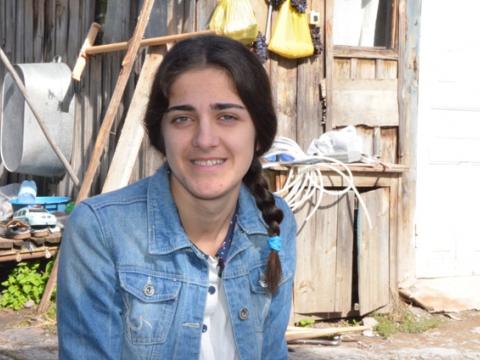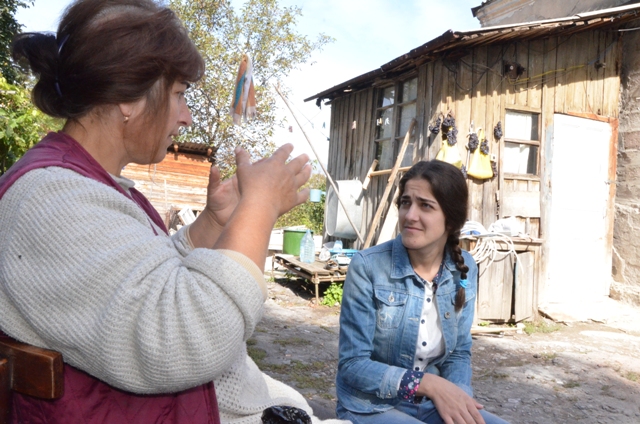Living in silence, when those around you are deaf to your dreams

If you ask 18-year-old Pikria how it feels to live in her community she would tell you it is “difficult”; of course she would use her hands, instead of her lips to communicate that truth. Life has been difficult from the beginning and it has only gotten worse as she has grown.
She was just 3 years old when she was diagnosed with deafness after a neighbour noticed that she did not respond to her name. It was a shock for her family. Her Mother, Maguli, still cannot talk about it without tears. Even after 15 years, she could not imagine how Pikria would live or how her family would communicate with her.
“She was a very nervous child because she could not explain what she needed and was always crying,” remembers Maguli.
At the age of 6, Pikria began going to school in her village, like the rest of the children. But, unlike many of the other children, this is not one of her favourite memories.
“I did not like school,” explains Pikria. “Nobody could understand me and I could not understand anything,” she says.
It was clear for the family that Pikria could not stay in that school. She felt school was a painful experience for her. At the age of 6, Pikria could not communicate with her family members. She could not explain her feelings. All she could do was cry, which she did frequently.
Pikria’s mother decided to take her to Tbilisi, the capital city, so she could study in boarding school for the deaf. “It was a difficult decision, as we do not have any family in Tbilisi and to let a 6-year-old child live and stay in foreign environment was not easy,” remembers her mother. “But, we understood that it was the only solution. Pikria had to study and learn how to communicate,” she adds.
The first year was very difficult for Pikria. She was far from her family and still did not know sign language. “Until I studied sign language and started communicating , expressing my feelings, I felt very bad,” she remembers. Right now, school is the only place where she has friends. She spends most of her time there and she feels happy.
It is still difficult for her to come to the village. Most of the time, she stays only few days and before she wants to go back to school. “I see that being with her peers, with friends who understand her fully makes her feel good,” says her mother.
Perhaps, one of the only times when Pikria has been able to hear, understand and communicate with her peers was at World Vision’s three-day camp. Pikria went with her interpreter. She was fully involved in all the activities and trainings. “It was a very good experience and very interesting time for me,” says Pikria.
Pikria has often longed to be integrated with youth outside her boarding school. But, unfortunately in many cases, it has just been a dream for her. The three days at the camp gave her this chance. It was a time when she could speak to her peers, through a interpreter. She could make herself understood and also understand them as well—something that is a rare opportunity.
The reason why Pikria often does not feel comfortable at home is that her parents do not know how to use sign language well.
“I did not have time to study her language,” says Pikria’s father, as he explains that he can only explain simple things to her.
And, although Pikria’a mother understands sign language better, she still has problems to explaining things properly. Pikria’s two sisters and one brother, the oldest is 20 year old the smallest 12 year old are able to speak to her better in sign language, but most of the time they are gone, so Pikria stays home alone. Although she loves her family, her eyes light up when she talks about boarding school, which she calls “home”.
Communication in a hearing world is frustrating for Pikira. Although she has learned to speak, her family, her community and those who know her remain deaf to her voice, unable to hear her needs or her dreams.
Unlike many high school students who wait with great anticipation for the end of their education, Pikria is fearful of the future. This is her last year in the boarding school. She will have to return to her community as her family does not have the ability to pay for ongoing education and living costs in the capital.
Editional Information :
For the first time in her life, World Vision gave Pikria chance to spend time with hearing peers, understand their thoughts and express her own thoughts. This past summer, Pikria spent five days at youth camp arranged by World Vision S-J ADP. She was there together with translator and it gave her chance to be involved in all the activities arranged during the camp.
It was good experience for me and I will participate with great pleasure in future similar activities” shares Pikria with us. The five days spent at the youth camp motivated Pikria to be closer to her hearing peers, but integration depends on more than her disposition, it also depends on those around her.
In Georgia, there are only two boarding schools for the deaf, one in the capital of Tbilisi and another in Kutaisis, west Georgia. Public schools are not prepared to help people with hearing problems. To date, receiving higher education in the University is not an option for these people. Their only option for ongoing education is a technical college where they can study handiwork.
Pikria dreams of having the chance to stay in Tbilisi and receive an education that will give her a chance at an independent life. With less than one year left of her education, her future is still not clear. She doesn’t know if she will be able to stay in Tbilisi and prepare for an independent life once her time at the boarding school comes to an end or if she will be forced to return to her community, where no one can understand her.
